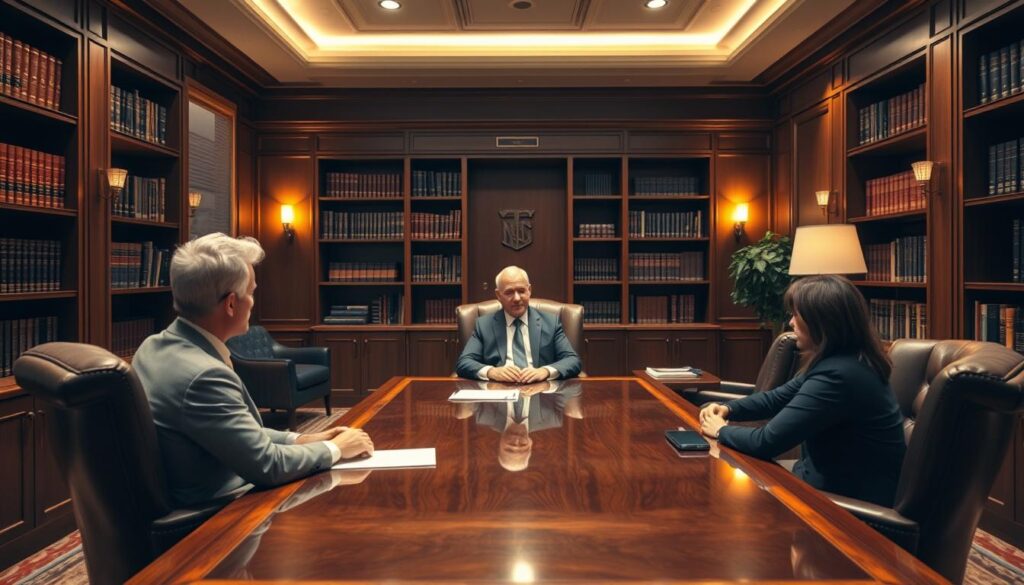Ever felt invisible at work because of your age? Workplace discrimination can really hurt your career and spirit. Age discrimination lawyers know how hard it is for professionals like you.
Every year, many workers face unfair treatment because of their age. In 2020, the Equal Employment Opportunity Commission saw over 67,448 discrimination charges. This shows age bias is a big problem. An age discrimination attorney can help you fight back.
Fighting workplace discrimination takes courage and legal know-how. Age discrimination lawyers protect your rights. They make sure your age doesn’t stop you from contributing at work.
Table of Contents
Understanding Age Discrimination in the Workplace
Workplace age bias is a big problem today. It affects many workers, blocking their career paths and chances for making money.
The laws protecting workers from age bias are complex. The Age Discrimination in Employment Act (ADEA) of 1967 is key. It protects workers 40 and older.
Federal and State Legal Protections
There are many laws against age bias in the workplace:
- Federal protection through the ADEA
- State-specific anti-discrimination laws
- Protections for employees in workplaces with 20 or more workers
Common Forms of Age-Based Discrimination
Age bias can show up in many ways:
- Hiring younger people over older ones
- Less chances for learning and growing
- Older workers being let go
- Being left out of important projects or promotions
Who is Protected Under the Law
Many think only older workers are protected. But the ADEA covers people 40 years and older. It tackles the tricky issue of age bias in the workplace.
About 20% of workers aged 45 and older say they’ve faced age bias at work. This shows age bias is still a big problem.
Knowing your rights is the first step against age bias at work. Workers need to watch out, keep records of bias, and get legal help when needed.
The Role of Age Discrimination Lawyers in Protecting Workers
Dealing with age discrimination can be very tough. Age discrimination lawyers are key helpers for older workers. They fight for their rights and challenge unfair work practices.
These lawyers support you at every important step:
- Checking if your age discrimination claim is strong
- Collecting important evidence of discrimination
- Explaining complex legal protections for older workers
- Helping in negotiations and court cases
Age discrimination lawyers are especially helpful against subtle biases. Under California law, employers with 5 or more employees must not discriminate against workers aged 40 and older.
Your lawyer will guide you on important things like:
- Keeping records of discriminatory acts
- Finding violations of state and federal laws
- Figuring out how much compensation you might get
- Meeting important filing deadlines
Many workers face age bias, with two-thirds of those aged 45-74 saying they’ve seen it. Working with a skilled age discrimination lawyer boosts your chances of winning your case and getting justice.
Key Signs of Age Discrimination at Work
It can be hard to spot age discrimination at work. Knowing the signs is key to protecting your rights. An adea lawyer can guide you in dealing with age harassment claims.
Workers over 40 often face age-related comments at work. Spotting these signs early can help safeguard your career.
Direct Evidence of Discrimination
Direct signs of age discrimination are clear and measurable:
- Explicit ageist comments about retirement or work capabilities
- Direct statements suggesting preference for younger workers
- Written documentation with discriminatory language
- Verbal instructions targeting older employees negatively
Circumstantial Evidence to Watch For
Age discrimination can also be subtle but harmful:
- Sudden negative performance reviews without clear reasons
- Being left out of important meetings or training
- Disproportionate layoffs targeting older workers
- Being overlooked for promotions despite good performance
Documentation Requirements
- Emails and written communications
- Performance evaluations
- Witness statements
- Dates of discriminatory incidents
An adea lawyer can review your documents and assess your case’s strength.
| Type of Evidence | Examples | Potential Impact |
|---|---|---|
| Direct Evidence | Ageist comments | Strong legal case |
| Circumstantial Evidence | Pattern of exclusion | Requires comprehensive documentation |
| Written Documentation | Performance reviews | Critical for legal proceedings |
Legal Framework: ADEA and State Regulations

It’s important to know the laws about age discrimination in the workplace. The Age Discrimination in Employment Act (ADEA) protects workers 40 and older. It stops unfair treatment because of age.
The ADEA covers many parts of work life. This means an adea lawyer can guide you through tough situations:
- Protects employees aged 40 and older
- Applies to employers with 20 or more employees
- Prohibits discrimination in hiring, firing, promotions, and benefits
- Covers federal, state, and local government employers
State laws also add extra protection. For example, the Florida Civil Rights Act (FCRA) offers more help:
| Regulation | Key Protection | Employee Coverage |
|---|---|---|
| ADEA | Federal protection | 40 years and older |
| FCRA | State-level protection | All ages |
An expert in age discrimination law can explain these rules. They can also help you decide what to do next.
Steps to Take When Facing Age Discrimination
Dealing with age discrimination at work can be tough. Knowing your rights and taking the right steps is key to keeping your career safe and your legal rights intact.
If you think you’re facing age discrimination, a clear plan can help protect you. Here are steps to tackle workplace bias effectively:
- Document Every Incident
- Record dates, times, and specific discriminatory actions
- Save emails, performance reviews, and communication evidence
- Note witnesses and specific discriminatory statements
- Internal Reporting Protocols
- Contact your Human Resources department
- Submit a formal written complaint
- Request documentation of your report
- Legal Considerations
- Understand ADEA filing deadlines (typically 180 days)
- Consult an employment discrimination attorney
- Preserve all employment-related documentation
“Knowledge of your rights is the first step in combating workplace discrimination.” – Employment Law Expert
Statistics show that 2 out of 3 workers over 45 face workplace discrimination. By being proactive and knowing your legal rights, you can fight age-based bias and keep your professional integrity safe.
Building a Strong Age Discrimination Case
Creating a strong age discrimination case needs careful planning and gathering evidence. Lawyers know that proving age bias in the workplace is complex. You must collect detailed evidence that shows unfair treatment because of age.
Important steps for a solid age discrimination claim include:
- Documenting specific incidents of discriminatory behavior
- Collecting written communications that suggest age-based bias
- Identifying potential witnesses who can corroborate your experience
- Tracking patterns of differential treatment
The best age discrimination cases use different types of evidence. Direct evidence might be clear statements about age. Circumstantial evidence shows patterns of discrimination. It’s known that 78% of older workers face or see age bias, showing how common it is.
Key documents for your case should be:
- Detailed records of discriminatory incidents
- Performance reviews showing sudden changes
- Email communications demonstrating unequal treatment
- Comparative data showing younger employees receiving preferential treatment
In 2020, the EEOC got over 14,000 age discrimination claims. They won $76.3 million for workers. Lawyers can help you fight for your rights and get the compensation you deserve.
Proving age discrimination requires strategic approach and compelling evidence of systemic workplace bias.
The Age Discrimination in Employment Act (ADEA) protects workers 40 and older. It’s a key law against age bias. With good documentation and a lawyer, you can fight age bias and get justice.
Compensation and Damages in Age Discrimination Claims
Understanding age discrimination claims is key. An age discrimination attorney can guide you. They help you seek damages that protect your career and well-being.
Knowing what financial help is available is vital. The law offers many ways to compensate for age discrimination. These options cover both financial and emotional losses.
Types of Available Damages
Workers facing age discrimination may get several types of compensation:
- Back Pay: Money for lost wages from discriminatory actions
- Front Pay: Future earnings lost due to discrimination
- Emotional Distress Damages: Money for psychological harm
- Punitive Damages: Penalties for serious misconduct
- Legal Fees and Court Costs
Settlement vs. Litigation Options
Your attorney will help choose between settlement or litigation. Settlements are quicker, but litigation might offer more compensation.
“The right legal approach depends on the specific circumstances of your case and the evidence available.” – Employment Law Expert
Recovery Potential
Recovery depends on several factors:
- Severity of discrimination
- Documentation of incidents
- Impact on career progression
- Employer’s history of discriminatory practices
Federal rules give employees 180 days to file a complaint. Some states extend this to 300 days. An experienced attorney can help you get the most compensation and protect your rights.
Working with Experienced Age Discrimination Lawyers

When you face age discrimination at work, finding the right lawyer is key. They protect your career rights. Lawyers with age discrimination experience can turn your legal fight into a chance for justice.
Choosing the right lawyer means looking at a few important things:
- Proven track record in age discrimination cases
- Deep understanding of federal and state employment laws
- Strong negotiation and litigation skills
- Comprehensive case assessment capabilities
Your ideal lawyer will support you every step of the way. They get the complex issues of workplace discrimination and guide you through legal steps with confidence.
Good legal help is more than just paperwork. It’s about knowing your situation and creating a plan just for you.
Top lawyers usually offer:
- Free initial case evaluations
- Clear talk about what might happen
- Strategic evidence collection
- Strong defense in talks and court
When you talk to lawyers, ask about their past cases. Look for those who have won settlements and lawsuits for age discrimination.
Remember, time is important in age discrimination cases. Federal laws set time limits for filing, so acting fast with a good lawyer is crucial.
Prevention Strategies and Employee Rights
Protecting older worker rights is a team effort. It starts with knowing your legal rights and taking steps to stop age discrimination.
Important prevention steps include:
- Creating strong anti-discrimination policies
- Offering regular diversity training
- Making work places welcoming for everyone
- Seeing age diversity as a plus
Workers over 40 have strong rights against age bias. The Age Discrimination in Employment Act (ADEA) protects them well.
“Age diversity strengthens workplace innovation and team performance.” – Workplace Equality Research Institute
Knowing your rights is key to fighting age bias. About 20% of older workers face bias at work. This shows why understanding your legal protections is so important.
| Employee Rights | Protection Scope |
|---|---|
| Filing Discrimination Complaints | EEOC and State Agencies |
| Protection from Retaliation | Federal and State Laws |
| Seeking Compensation | Back Pay, Emotional Distress |
Employers need to see the value of age diversity. Companies with diverse ages do 35% better in profits.
By standing up for your rights, you help make work places fairer and more welcoming for everyone.
Recent Trends in Age Discrimination Cases
The world of age discrimination law has changed a lot lately. More older workers are filing claims of age discrimination at work. This shows big challenges for older employees in many fields.

- About 20% of all EEOC claims are about age
- Age discrimination cases went up by over 30% since COVID-19
- 58% of older workers say they’ve faced age discrimination at work
- Age discrimination now makes up about 15% of all employment lawsuits
Notable Court Decisions
Courts are getting better at handling age harassment claims. They’re looking at big patterns of bias, not just single incidents.
“Age discrimination is not just about numbers, but about recognizing the value of experience and expertise in the workplace.”
Emerging Legal Precedents
New laws are helping protect workers more. The Age Discrimination in Employment Act (ADEA) is key. Courts are now holding employers responsible for age bias.
Age discrimination cases are getting more complex. They often mix with other biases like gender and race. This opens up more legal paths for workers facing discrimination.
Knowing these trends helps you spot and fight age discrimination at work.
Conclusion
Age discrimination is a big problem in today’s job world. It affects people over 40 a lot. Lawyers who specialize in age discrimination help protect workers’ rights. They fight against unfair biases that hurt career chances.
Everyone can help make jobs fairer. Knowing your rights under the Age Discrimination in Employment Act (ADEA) is key. Keeping records of unfair treatment and getting legal advice are important steps. Lawyers are essential in fighting for fair treatment at work.
Fighting age discrimination is not just for personal gain. It’s about changing work cultures. Every complaint and legal action helps break down stereotypes. It makes work places more welcoming for everyone, no matter their age or experience.
To fight age bias, we need to keep learning and stay alert. We must also stand up against unfair practices. With the right support, we can protect our rights and make work places better for everyone.
FAQ
What is age discrimination in the workplace?
Who is protected under age discrimination laws?
What are some common signs of age discrimination?
How do I prove age discrimination?
What compensation can I receive in an age discrimination case?
How long do I have to file an age discrimination claim?
Can my employer retaliate against me for filing an age discrimination complaint?
Do I need a lawyer for an age discrimination case?
What should I do if I believe I’m experiencing age discrimination?
Are remote workers protected by age discrimination laws?
There are no reviews yet. Be the first one to write one.

